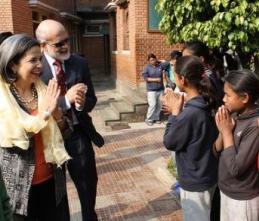
On February 13, Mario Otero, US Special Coordinator for Tibetan Affairs, arrived in Kathmandu for a round of talks. And on the same day the Nepali police forced Chushi Gangdruk to abruptly end its elections to the dismay of local Tibetan refugees. By design or accident, the police action provided an opportunity to the American official to know and hear first hand the problems of the Tibetan refugees, who continue to stream into the Himalayan State.
Police in riot gear armed with guns and batons stormed into Chushi Gangdruk election centers at three places -Swoyambhu, Jawalakhel and Boudha, and carted away the ballot boxes, after driving away the ‘voters’. For the veterans of a Tibetan resistance force that had battled the Chinese People’s Liberation Army (1958-1974), and established the charity, the police action was yet another manifestation of Nepal government yielding to the Chinese pressure.
Nepal supports “one-China policy” and accepts Beijing’s stand that Tibet is an integral part of China. It has pledged repeatedly that it will not allow its territory to be used against Beijing. Kathmandu officials project the action against Chushi Gangdruk as a logical extension of this policy but Tibetan exiles don’t think so.
A member of the Chushi Gangdruk’s election committee told the International Campaign for Tibet (ICT), “Ours are organisational elections to select new leaders to carry out our charitable work. We are in no way promoting anti-Chinese activities”.
US government appears to share this view. “We’re concerned about the Nepal police action that interrupted the elections of the legally registered NGO welfare activities of the Tibetan refugee community in Nepal that happened on Sunday,” a State Department Official said in a statement in Washington.
Last year, Nepal’s police prevented Tibetans from taking part in elections to the government-in-exile of Dalai Lama.
The US has called on Nepal to honour the UN-brokered ‘gentlemen’s agreement’ on Tibetans fleeing their homeland.
Otero, who is also the US under secretary for democracy and global affairs, discussed the Tibetan refugees’ issue with Nepali leadership. The American official asked her hosts to provide the Buddhist community “free passage to India” as per global human rights obligations.
In her meeting with Prime Minister Jhalanath Khanal, who came to power with the backing of Maoist supremo Prachanda on an anti-India plank, Mario Otero said the government should treat Tibetan refugees with sympathy and understanding as per international human rights obligations.
She also raised the issue of free passage for the refugees from Tibet. “There is a stable practice while dealing with Tibetan issues which ensures providing them free passage to India,” the US envoy was quoted as saying by the Kantipur online.
About Otero – Khanal meeting, Milan Tuladhar, Nepal Prime Minister’s Advisor (foreign relations) said the visiting American under-secretary highlighted the problems faced by the Tibetans in Nepal. “She expressed concern about what policy Nepal has, if Tibetan refugees arrive here, and raised the issue of identification of such refugees who have been living in Nepal for decades,” Milan Tuladhar told The Himalayan Times. “The Prime Minister told her we will deal with the issue taking into account the concerns of our immediate neighbours — China and India”
The Tibetan Refugee Transit Center (TRC) was established in Kathmandu in the early 1990s in response to concern in US Congress that Tibetans fleeing oppression needed assistance and protection after what is typically a dangerous crossing through the high mountain passes that separate Tibet and Nepal.
TRC is funded by the office of the United Nations High Commissioner for Refugees (UNHCR). It has since become a vital link in a so-called “Gentleman’s Agreement” between the Nepal government and the UNHCR.
US Special Coordinator for Tibetan Affairs visited the TRC and met with Tibetan refugees, some of whom are awaiting clearance for going to Dharamshala (India) where their spiritual leader Dalai Lama is living since he fled from Lhasa in 1959.
Nepal is home to around 20,000 exiled Tibetans and the capital has been the scene of several anti-China agitations for freedom and human rights in Tibet. But only those Tibetan refugees who had arrived in the country prior to 1989 are treated as “residents” and are given ‘limited access’ to social, economic, political, and civil rights.
Some 2,500 Tibetans cross into Nepal every year despite tight security enforced on either side of the border areas. From Kathmandu they plan to go and meet the Dalai Lama. Nepal has warned Tibetans exiles against organizing protests against China and has placed a virtual security ring around them.
The Feb 13 police action against Chushi Gangdruk elections has created a domestic controversy amidst charges that the Jhalanath Khanal government, which is swayed by Maoist rhetoric, is kowtowing to pressures from Beijing. The Chinese are known to use their financial clout in Kathmandu to further their Tibetan policy objectives.
Given his limited turf space, Prime Minister Khanal cannot afford to face such charges. Refugees should be treated with respect. Otherwise, Kathmandu will face international opprobrium.

Be First to Comment